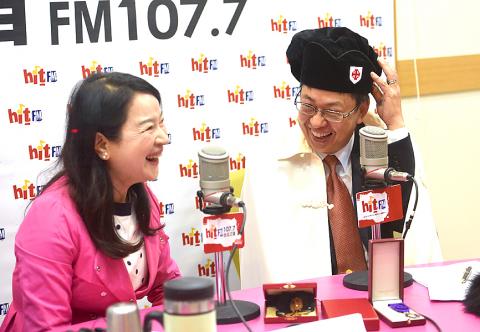Media personality Clara Chou (周玉蔻) was found not guilty of defamation by the Taipei District Court yesterday in a case involving President Ma Ying-jeou (馬英九) and allegations of illicit political donations by Ting Hsin International Group (頂新國際集團).
The court’s decision was based on interpretation of Article 310 of the Criminal Code, in stating that “although the defendant cannot prove if the expressed statements were true, if according to the evidence and materials presented the defendant has reason to believe in their veracity, then the case cannot be prosecuted as defamation and its related punishment.”
Prosecutors filed the case against Chou after she made accusations on talk shows and in statements to media outlets in December of 2014 saying that she had evidence that Ma had received NT$200 million (US$6.05 million at current exchange rates) in an off-the-books political donation from the owners of Ting Hsin.

Photo: Lo Pei-der, Taipei Times
Chou’s allegations came amid a public furor over a tainted food scandal involving the group after the company was found to have used adulterated ingredients in its oil products and she insinuated that Ma had become a “guardian protector,” shielding the group from prosecution.
Some political pundits and members of the public hailed yesterday’s court ruling as a victory for Chou and critics of the Ma administration, and as a major blow to Ma and his reputation.
In response, Ma expressed his dissatisfaction with the court’s ruling and issued a statement saying that he had requested his lawyers to appeal the ruling.
“President Ma regrets the court ruling. In recent years, a number of pundits and media figures have made groundless accusations, saying they have inside information. They have tarnished reputations and such abhorrent actions have resulted in a more chaotic society. We should condemn these developments and therefore we have requested that the lawyers appeal, to preserve goodwill and kindness in society,” the statement issued by Presidential Office spokesperson Charles Chen (陳以信) said.
Chou also accused former Presidential Office deputy secretary-general Lo Chih-chiang (羅智強) of receiving benefits from Ting Hsin and said that Senhwa Biosciences chairman Benny Hu (胡定吾), a friend of Ma’s, had acted as a middleman in the NT$200 million donation.
Hu is also a board member of Taipei Financial Center Corp (台北金融大樓公司), the firm that operates Taipei 101.
Chou also alleged that Hon Hai Precision Industry Co (鴻海精密) chairman Terry Gou (郭台銘) made a secret donation of NT$300 million to then-Chinese Nationalist Party (KMT) Taipei mayoral candidate Sean Lien (連勝文) last year.

NATIONAL SECURITY THREAT: An official said that Guan Guan’s comments had gone beyond the threshold of free speech, as she advocated for the destruction of the ROC China-born media influencer Guan Guan’s (關關) residency permit has been revoked for repeatedly posting pro-China content that threatens national security, the National Immigration Agency said yesterday. Guan Guan has said many controversial things in her videos posted to Douyin (抖音), including “the red flag will soon be painted all over Taiwan” and “Taiwan is an inseparable part of China,” while expressing hope for expedited “reunification.” The agency received multiple reports alleging that Guan Guan had advocated for armed reunification last year. After investigating, the agency last month issued a notice requiring her to appear and account for her actions. Guan Guan appeared as required,

A strong cold air mass is expected to arrive tonight, bringing a change in weather and a drop in temperature, the Central Weather Administration (CWA) said. The coldest time would be early on Thursday morning, with temperatures in some areas dipping as low as 8°C, it said. Daytime highs yesterday were 22°C to 24°C in northern and eastern Taiwan, and about 25°C to 28°C in the central and southern regions, it said. However, nighttime lows would dip to about 15°C to 16°C in central and northern Taiwan as well as the northeast, and 17°C to 19°C elsewhere, it said. Tropical Storm Nokaen, currently

PAPERS, PLEASE: The gang exploited the high value of the passports, selling them at inflated prices to Chinese buyers, who would treat them as ‘invisibility cloaks’ The Yilan District Court has handed four members of a syndicate prison terms ranging from one year and two months to two years and two months for their involvement in a scheme to purchase Taiwanese passports and resell them abroad at a massive markup. A Chinese human smuggling syndicate purchased Taiwanese passports through local criminal networks, exploiting the passports’ visa-free travel privileges to turn a profit of more than 20 times the original price, the court said. Such criminal organizations enable people to impersonate Taiwanese when entering and exiting Taiwan and other countries, undermining social order and the credibility of the nation’s

‘SALAMI-SLICING’: Beijing’s ‘gray zone’ tactics around the Pratas Islands have been slowly intensifying, with the PLA testing Taiwan’s responses and limits, an expert said The Ministry of National Defense yesterday condemned an intrusion by a Chinese drone into the airspace of the Pratas Islands (Dongsha Islands, 東沙群島) as a serious disruption of regional peace. The ministry said it detected the Chinese surveillance and reconnaissance drone entering the southwestern parts of Taiwan’s air defense identification zone early yesterday, and it approached the Pratas Islands at 5:41am. The ministry said it immediately notified the garrison stationed in the area to enhance aerial surveillance and alert levels, and the drone was detected in the islands’ territorial airspace at 5:44am, maintaining an altitude outside the effective range of air-defense weaponry. Following